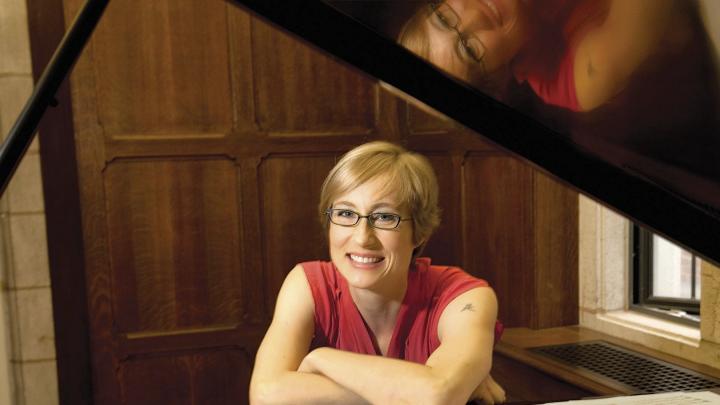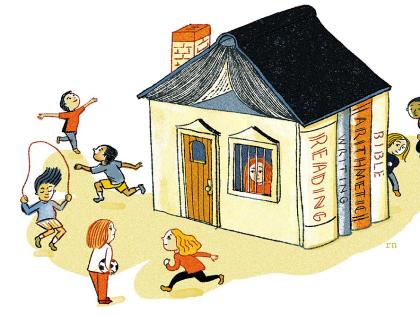There is nothing casual about the music of composer Hannah Lash, Ph.D. ’10. “I’m drawn to highly, highly pigmented emotions,” she says. “Things have to be the most fully realized they can possibly be.”
That was certainly the case in 2010, when a thief broke into her car and stole her laptop, wallet, and iPod while she was at a new-music festival in Buffalo. As any victim would, Lash felt intensely assaulted. But slowly, her perception began to shift. “With any theft, your natural impulse is to want some form of retaliation,” she recalls. “That, to me, felt really ugly. I didn’t want that feeling at all.”
So she wrote Violations: The Loading Dock Project, a 35-minute piece for five instruments and three singers that will premiere at Yale on March 28. Lash will mount subsequent performances in a bona fide loading dock—a “rough and public” space approximating a stage that will perhaps convey the grimy transfer of her property. The libretto speaks of loss, but also of the vexing relationship of thief and victim. “It’s recognizing the intense fallibility behind what we think of as evil,” she says.
Such dark thoughts don’t immediately gibe with Lash’s fresh, breezy demeanor. Her music, though, clearly displays her intensity. The vibraphone-and-piano composition C is six minutes of frenetic fretting; her 2011 piece Music for Loss, written after her father died last year, starts with a celesta, xylophone, and glockenspiel conveying a gentle, almost crystalline-sounding trip backward through time. Eventually, accompanied by increasing disquietude and poignant probing, it culminates in a crescendo of realization.
And then there is Blood Rose, Lash’s unique operatic take on “Beauty and the Beast.” There is no Disneyesque happy ending here; instead, the singers and string quartet impart what she calls a “sort of emotional cannibalism between the two characters—and you can’t really distinguish them.”
In The New York Times, Steve Smith wrote that Lash combines “avant-garde techniques with a post-Romantic expressiveness.” Martin Bresnick, her postgraduate mentor in the Artist Diploma program at the Yale School of Music—where she has just joined the faculty—has his own take. “There is a high seriousness to Hannah,” he says. “It’s almost Puritan—it’s a single and direct expression of one’s soul. It’s a very American type, and she burns with it. She really does control a very powerful inner engine of imagination.”
That engine revved up long before she entered the Eastman School of Music at 16; Lash was homeschooled in rural Michigan by her librarian parents, who aimed to offer their daughter a less compartmentalized approach to learning, allowing her “the run of a library,” as she says. It also allowed her to develop her innate calling early on: Lash first picked up a violin at age four. Because she could not yet read music, she devised her own unique notation of Xs and triangles and squiggles. “I spent 90 percent of my time doing some form of music, whether it was writing, playing, or listening,” she says.
She was drawn to Harvard for graduate work because of its rich roster of guest lecturers and emphasis on theory, which contrasted nicely with the more practice-based aspects of Eastman. In Cambridge, she served as a teaching fellow under the “beautifully organized” Suzannah Clark, Cowles associate professor of music. “It was a wonderful challenge to teach the undergraduates, because at Eastman everyone was at such a high musical level,” she says. “At Harvard, the kids were so intelligent but didn’t always have proficiency with instruments. And, of course, one of the major perks was the wonderful library. I spent a lot of time in the Nadia Boulanger archives.”
Today, Lash’s preferred instruments are the piano and especially the harp. “It’s so unusual for a composer to be a harpist,” she acknowledges. “I can’t say it influences my music, but I do enjoy the saturation of sound. And although the harp isn’t a very loud instrument, I do feel it has a resonance—you feel like you’re awash with sound.”
Serendipitously, while playing harp for The Fantasticks in New York, she met actor Steve Routman; they married in 2010. Not being especially religious, Lash eschewed both a traditional ceremony and traditional music. Instead, she gave her guests instruments and what she calls “a graphic score” so they could play an original percussive piece for chimes, bells, a small gong, and two Tibetan singing bowls. Like all of her work, it was keenly felt.
“I wanted it to feel like, ‘We’re celebrating this and it is very private but also we’re here together,’” she says, smiling. “So I imagined how it is when you sit in the evening in the summer and you start to hear one frog call and then you hear a whole bunch of frogs start to call, too. Each one is sort of in his own isolated spot, yet it’s this common experience.”








